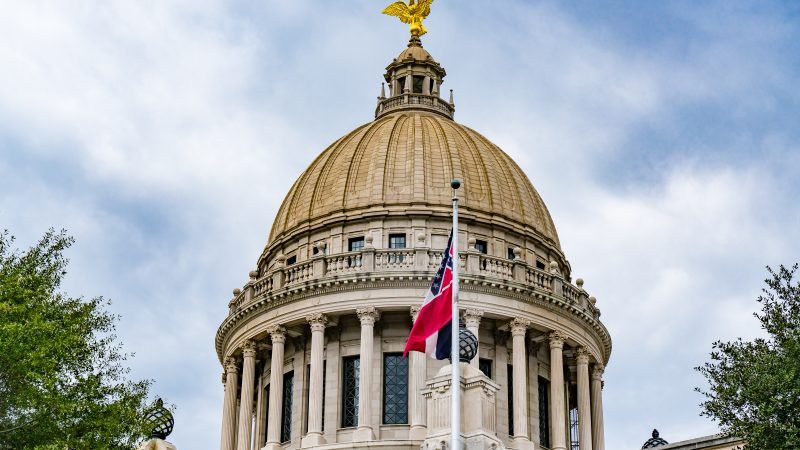Civil Rights Groups Urge Federal Appeals Court To Strike Down Mississippi's Jim Crow–Era Felon Voting Ban
A broad coalition of civil rights groups and think tanks, including Reason Foundation, say that Mississippi's "mandatory, permanent, and effectively irrevocable" voting ban for certain offenders violates the Constitution.

Civil rights groups are urging a federal appeals court to uphold a ruling that found Mississippi's lifetime felon disenfranchisement law, which ranks among the harshest in the nation, violates the Constitution.
In August, a panel of judges for the U.S. Court of Appeals for the 5th Circuit blocked Mississippi's felon disenfranchisement law in a 2–1 ruling, finding that the state's lifetime voting ban for those convicted of certain crimes constituted cruel and unusual punishment under the Eighth Amendment. Mississippi Republican Attorney General Lynn Fitch successfully petitioned the full 5th Circuit for an en banc rehearing.
A broad coalition of civil liberties groups and think tanks filed an amicus brief in that case, Hopkins v. Watson, last week, including the American Civil Liberties Union, the Brennan Center for Justice, the Cato Institute, and Reason Foundation, the nonprofit that publishes Reason. Those groups argue that the 5th Circuit panel correctly diagnosed the constitutional problems with Mississippi's "mandatory, permanent, and effectively irrevocable" voting ban for certain felony offenders.
The drafters of Mississippi's 1890 constitution admitted that they intentionally chose a list of crimes they believed most likely to lead to the disenfranchisement of black residents, such as forgery and bigamy. Rape and murder were not added to the list, which now includes 22 offenses, until 1968.
"Its historical origins in noxious, intentional racial discrimination offend the dignity of the individual and society," the brief says. "Its mandatory nature and lack of an accessible, non-arbitrary path to reentry make it functionally irrevocable—even for minor offenses that carry short terms of imprisonment, like writing a bad check for $100—and thus grossly disproportionate."
Mississippi's brazenness makes it unique, the brief states: "No other state, in the South or elsewhere, still maintains a disenfranchisement scheme so openly originating in Jim-Crow discrimination."
And the groups argue that the provision is still having its intended effect. Between 1994 and 2017, over 29,000 Mississippians were convicted of disenfranchising offenses, according to the brief. Of those people, 58 percent were black, despite only roughly 37 percent of Mississippi's total population being black during that time frame.
"Today, more than 15% of Black adults in Mississippi are permanently disenfranchised—an indication of Section 241's continued effectiveness at achieving its original aims," the brief argues.
In its petition for an en banc rehearing, the Mississippi Attorney General's Office argued that the panel incorrectly ruled that the voting ban was punishment. "Under Supreme Court precedent, Section 241 of the Mississippi Constitution is a nonpunitive voting regulation," the office wrote, pointing to widespread and mostly unconstrained felon voting laws in other states. "Third, even if disenfranchisement were a punishment, it is not cruel and unusual."
Although widespread, felon disenfranchisement laws have fallen out of favor in recent years, and several states with especially harsh laws have passed reforms. In Florida, another state with Jim Crow–era felon disenfranchisement laws, voters approved an amendment to the state constitution in 2018 restoring voting rights to those who have completed all the terms of their sentences, although its implementation has been clouded by controversy and lawsuits.
This will be the second time that the 5th Circuit, considered one of the most conservative circuits in the country, has ruled on the constitutionality of Mississippi's lifetime voting ban for certain offenses. Last year, it upheld the provision in a different suit challenging it on equal protection grounds.
Show Comments (59)